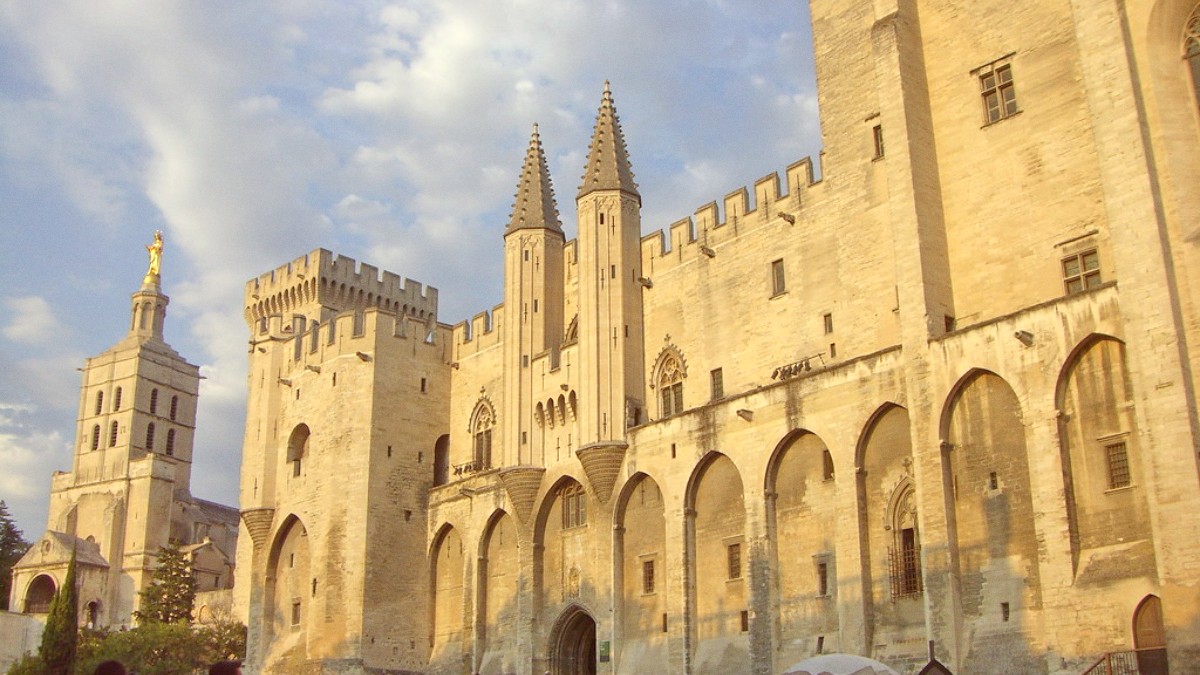
Provence, France
Provençal cuisine is part of the broader Mediterranean diet. It highlights fresh, seasonal ingredients, especially local ones. Historically, the food shows the land's bounty, with olive oil as the main cooking fat, garlic, herbs, and vegetables.
Its flavors are bold and aromatic, from the land and nearby sea. The cuisine grew from a peasant tradition, using local produce to make wholesome and flavorful dishes.
Olive oil is everywhere. Core ingredients include garlic, ripe tomatoes, aubergines (eggplant), courgettes (zucchini), bell peppers, onions, and various olives. Anchovies appear in some traditional dishes. Lamb and fresh fish are common proteins. The region uses 'Herbes de Provence' (thyme, rosemary, basil, oregano, marjoram).
Flavors are aromatic, savory, and often a little sweet from sun-ripened vegetables. Provençal cooking uses less butter and cream than northern French cuisine, instead using the richness of olive oil and fresh herbs.
While Avignon is in Provence, the wider region has some sub-variations. The main theme stays: fresh, local produce and Mediterranean influences. Dishes in Avignon are classic Provençal style, often with Vaucluse specialities.
A traditional beef stew. Cooks marinate beef in red wine, vegetables, garlic, and Herbes de Provence. The stew cooks slowly until the meat is tender.
Find this hearty dish in traditional Provençal restaurants, especially in cooler months.
A vegetable stew of eggplant, zucchini, bell peppers, onions, and tomatoes, cooked in olive oil and herbs.
Served as a side or light main. Available widely, especially in summer.
A savory spread from black olives, capers, anchovies, and olive oil.
Served with bread as an appetizer. Find tapenade in most Provençal restaurants and local markets.
The Côtes du Rhône wine region is around Avignon. Try powerful reds from Châteauneuf-du-Pape, Gigondas, and Vacqueyras. Provence is known for dry, crisp rosé wines, good for summer.
An anise-flavored aperitif. A popular drink in Provence, diluted with water, turning it cloudy. Drink before a meal.
For a memorable culinary experience, Avignon has high-end restaurants.
Many mid-range options are inside the city walls, for various tastes.
Affordable and authentic meals are found in markets and casual spots.
Visit in the morning for full energy. Daily (except Monday) covered food market for fresh produce, cheeses, and prepared dishes.
A sensory experience.
Avignon has several outdoor markets. Place des Carmes (Saturday mornings) has food, flowers, and local products. Place du Marché (Thursday mornings) is a general market.
Villeneuve-lès-Avignon has a larger popular market on Saturday mornings.
Find Italian trattorias.
Eateries (Chinese, Vietnamese, Japanese).
Restaurants (couscous or tagines).
Giving alternatives to French cuisine.
Limited dedicated halal establishments in Avignon.
Some larger supermarkets may have certified halal products.
Limited dedicated kosher establishments in Avignon.
Finding specialized restaurants can be difficult. Research ahead or consider self-catering.
The most effective approach is to communicate your needs politely and clearly.
Several local chefs and guesthouses in and around Avignon have Provençal cooking classes. These often have a visit to a local market to pick ingredients, then hands-on cooking of traditional dishes.
Guided walking tours focusing on local specialities, market visits, and tastings are available. These tours give cultural context and let you sample various Provençal delicacies.
In nearby Grasse, the world's perfume capital, you can participate in workshops to learn about perfume creation and blend your own scent.
An annual event in autumn celebrating local produce and gastronomy.
Check local listings for dates.
Various local food events and markets happen throughout the year in the Vaucluse department.
A good way to experience local specialties.
Look for establishments emphasizing fresh, locally sourced ingredients to truly experience the taste of Provence.
Some restaurants offer dining in historic courtyards, giving a charming ambiance.
Others boast views of the Palais des Papes or the Rhône, making the dining experience even better.
Beyond dining in restaurants, Avignon and its surroundings have various immersive culinary experiences.